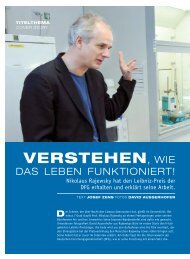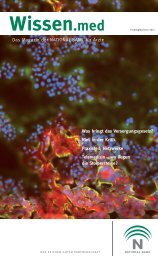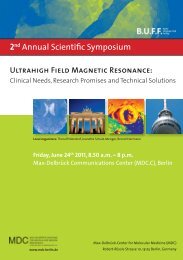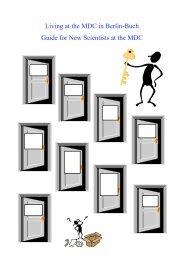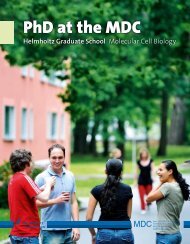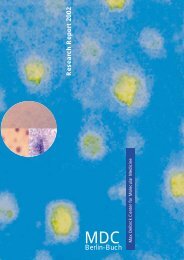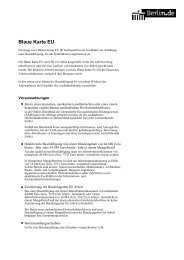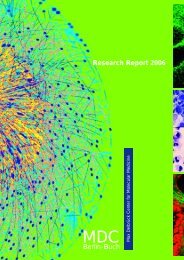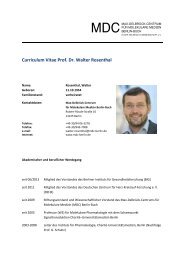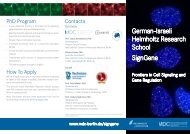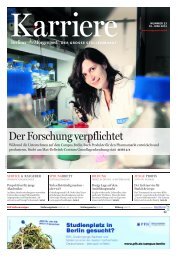The ultrahigh field MR facility was opened in January2009. By the end of 2009, the facility has beenenlarged by a second floor to house a new 3 Tesla clinicalscanner in addition to a 9.4 Tesla animal scannerand a 7 Tesla whole body scanner, resulting in a totalof 913 m of research space for MR technologies.Thoralf Niendorf was appointed director of the facilityin 2009. A physicist by training, Thoralf Niendorf isa leading expert in MR imaging with a research experiencein academia and industry.To house the ERC, the <strong>MDC</strong> will start construction ona new building in close proximity to the MR facility inspring <strong>2010</strong>. The ERC building will comprise ca. 2600m 2 of highly flexible laboratory and office space fortranslational research projects.Educational missionAn important motivation for the project is the needfor a new breed of researcher: a “physician-scientist”equally at home in the clinic and the basic researchlab. Translational research involves all levels of biologicalorganization, from the structures and functionsof single molecules to the overall health of an organismover the long term, Physicians and basicresearchers have complementary perspectives andexpertise that need to be combined – ideally in a singleperson – to design meaningful basic experimentsthat will shed light on disease processes in patients.The centerpiece of the educational activities is atraining program for clinicians in basic molecularbiology, jointly sponsored by the <strong>MDC</strong> and Charité, inwhich clinicians take “time out” from their clinicalduties and join a laboratory run by an <strong>MDC</strong> basic scientist.Entry into the program (Kliniker Ausbildungsprogramm,or KAP, in German) is gained through acompetitive application procedure. Proposals arepeer-reviewed with intermittent follow-up.Successful applications commonly lead to long-termcollaborations between a clinical group and the <strong>MDC</strong>basic science laboratory hosting the applicant.schern auszubilden, die gleichermaßen in der Klinik wieim Forschungslabor zu Hause sind. Die translationaleForschung spannt den Bogen von der Struktur undFunktion einzelner Moleküle bis zur ganzheitlichenFunktion des Organismus. Ärzte und experimentelleBiologen haben einander ergänzende Denkweisen undErfahrungen, die vereinigt werden müssen – idealerweisein einer Person – wenn Experimente so konzipiertsein sollen, dass sie zu neuen Einsichten über Krankheitsprozessein Patienten führen können.Eine Schlüsselkomponente des ECRC ist daher ein Trainingsprogramm,um den „Physician Scientist“ mit dementsprechenden Expertise-Profil auszubilden. Ein zentralesElement ist hierbei das Ausbildungsprogramm fürKliniker in der Molekularbiologie, das von Charité und<strong>MDC</strong> gemeinsam gestaltet wird. Hier können Klinikereine „Auszeit“ von ihren klinischen Pflichten nehmenund in einem Labor arbeiten, das von einem <strong>MDC</strong>-Forschergeleitet wird. Der Zugang zum Kliniken Ausbildungsprogramm(KAP) ist über ein kompetitives Bewerbungsverfahrengeregelt. Der Projektfortschritt wirddurch eine Zwischenevaluation überprüft. Gleichzeitigbildet der Gastaufenthalt oftmals die Ausgangsbasisfür eine längerfristige Zusammenarbeit zwischen demKAP-Stipendiaten und der gastgebenden Abteilung.PerspektivenDas ECRC wird wichtige Infrastrukturkomponenten fürweitere Projekte bereitstellen, die sich gegenwärtig imPlanungsstadium befinden, bspw. ein Deutsches Zentrumfür Kardiovaskuläre Forschung (DZHK) und einDeutsches Institut für Kardiovaskuläre Forschung(DIHK, wie in der Einleitung zum <strong>Research</strong> <strong>Report</strong>erwähnt). Wenn das DIHK wie vorgesehen auf demCampus Buch angesiedelt wird, könnte es von derunmittelbaren Nachbarschaft des ECRC mit seinentechnologischen Plattformen und seiner Forschungsinfrastrukturprofitieren.PerspectivesThe ECRC will provide vital infrastructure for someother projects that are currently being planned, suchas the establishment of a German Center forCardiovascular <strong>Research</strong> (Deutsches Zentrum für206 The Experimental and Clinical <strong>Research</strong> Center
Kardiovaskuläre Forschung, DZHK) and a GermanInstitute for Cardiovascular <strong>Research</strong> (DeutschesInstitut für Kardiovaskuläre Forschung, DIHK) whichhave been proposed by the <strong>MDC</strong> and Charité. The proposalforesees the construction of the DIHK on theBerlin-Buch campus, which would put it in the immediatevicinity of the ECRC and its technological platformsand infrastructure.Structure of the ECRCDirectorFriedrich C. LuftChief AdministratorRegina JüngerProgram ManagerCornelia MaurerSteering committeeWalter Rosenthal (<strong>MDC</strong> Director)Annette Grüters-Kieslich (Charité Dean)Cornelia Lanz (<strong>MDC</strong> Administrative Director)Gerrit Fleige (Administrative Head of the CharitéFaculty)ECRC Council (chairman)Thomas SommerSelected publications of ECRC participantsMathas, S, Kreher, S, Meaburn, KJ, Jöhrens, K, Lamprecht, B, Assaf, C,Sterry, W, Kadin, ME, Daibata, M, Joos, S, Hummel, M, Stein, H, Janz, M,Anagnostopoulos, I, Schrock, E, Misteli, T, Dörken, B. (2009) Gene deregulationand spatial genome reorganization near breakpoints prior toformation of translocations in anaplastic large cell lymphoma. ProcNatl Acad Sci U S A. 106, 5831-6.Stein, U, Walther, W, Arlt, F, Schwabe, H, Smith, J, Fichtner, I, Birchmeier,W, Schlag, PM. (2009) MACC1, a newly identified key regulator of HGF-MET signaling, predicts colon cancer metastasis. Nat Med. 15, 59-67.Prozorovski, T, Schulze-Topphoff, U, Glumm, R, Baumgart, J, Schröter, F,Ninnemann, O, Siegert, E, Bendix, I, Brüstle, O, Nitsch, R, Zipp, F, Aktas, O.(2008) Sirt1 contributes critically to the redox-dependent fate of neuralprogenitors. Nat Cell Biol. 10, 385-94.Hauck, L, Harms, C, An, J, Rohne, J, Gertz, K, Dietz, R, Endres, M, vonHarsdorf, R. (2008) Protein kinase CK2 links extracellular growth factorsignaling with the control of p27(Kip1) stability in the heart. Nat Med.14, 315-24.Organisationsstruktur des ECRCDirektorFriedrich C. LuftKaufmännische LeiterinRegina JüngerProgramm-ManagerinCornelia MaurerLenkungsausschussWalter Rosenthal (Wissenschaftlicher Vorstand, <strong>MDC</strong>)Annette Grüters-Kieslich (Dekanin, Charité)Cornelia Lanz (Administrativer Vorstand, <strong>MDC</strong>)Gerrit Fleige (Kaufmännischer Leiter der Fakultät,Charité)ECRC-Rat (Vorsitzender)Thomas SommerAusgewählte Publikationen von Forschern des ECRCMathas, S, Kreher, S, Meaburn, KJ, Jöhrens, K, Lamprecht, B, Assaf, C,Sterry, W, Kadin, ME, Daibata, M, Joos, S, Hummel, M, Stein, H, Janz, M,Anagnostopoulos, I, Schrock, E, Misteli, T, Dörken, B. (2009) Gene deregulationand spatial genome reorganization near breakpoints prior to formationof translocations in anaplastic large cell lymphoma. Proc NatlAcad Sci U S A. 106, 5831-6.Stein, U, Walther, W, Arlt, F, Schwabe, H, Smith, J, Fichtner, I, Birchmeier, W,Schlag, PM. (2009) MACC1, a newly identified key regulator of HGF-METsignaling, predicts colon cancer metastasis. Nat Med. 15, 59-67.Prozorovski, T, Schulze-Topphoff, U, Glumm, R, Baumgart, J, Schröter, F,Ninnemann, O, Siegert, E, Bendix, I, Brüstle, O, Nitsch, R, Zipp, F, Aktas, O.(2008) Sirt1 contributes critically to the redox-dependent fate of neuralprogenitors. Nat Cell Biol. 10, 385-94.Hauck, L, Harms, C, An, J, Rohne, J, Gertz, K, Dietz, R, Endres, M, vonHarsdorf, R. (2008) Protein kinase CK2 links extracellular growth factorsignaling with the control of p27(Kip1) stability in the heart. Nat Med.14, 315-24.Machnik, A, Neuhofer, W, Jantsch, J, Dahlmann, A, Tammela, T, Machura,K, Park, JK, Beck, FX, Müller, DN, Derer, W, Goss, J, Ziomber, A, Dietsch, P,Wagner, H, van Rooijen, N, Kurtz, A, Hilgers, KF, Alitalo, K, Eckardt, KU,Luft, FC, Kerjaschki, D, Titze, J. (2009) Macrophages regulate salt-dependentvolume and blood pressure by a vascular endothelial growth factor-C-dependent buffering mechanism. Nat Med. 15, 545-52.Machnik, A, Neuhofer, W, Jantsch, J, Dahlmann, A, Tammela, T, Machura,K, Park, JK, Beck, FX, Müller, DN, Derer, W, Goss, J, Ziomber, A, Dietsch, P,Wagner, H, van Rooijen, N, Kurtz, A, Hilgers, KF, Alitalo, K, Eckardt, KU,Luft, FC, Kerjaschki, D, Titze, J. (2009) Macrophages regulate saltdependentvolume and blood pressure by a vascular endothelialgrowth factor-C-dependent buffering mechanism. Nat Med. 15, 545-52.The Experimental and Clinical <strong>Research</strong> Center 207
- Page 1:
Research Report 2010MAX DELBRÜCK C
- Page 4 and 5:
ContentInhaltContentInhalt.........
- Page 6 and 7:
Surgical OncologyPeter M. Schlag...
- Page 11 and 12:
at the MDC. The role of the institu
- Page 13 and 14:
in discovering genes that contribut
- Page 16 and 17:
The ECRC offers research space and
- Page 18 and 19:
etween disciplines such as biology,
- Page 20 and 21:
approaches from bioinformatics/syst
- Page 23 and 24:
von Humboldt Foundation (AvH). The
- Page 25:
organization to a larger, multi-fac
- Page 28 and 29:
Cardiovascular and Metabolic Diseas
- Page 30 and 31:
electrical signals. More recent wor
- Page 32 and 33:
Basic Cardiovascular FunctionStruct
- Page 34 and 35:
Figure 2: SORLA and sortilin in neu
- Page 36 and 37:
Annette Hammes(Delbrück Fellow)Str
- Page 38 and 39:
Ingo L. MoranoStructure of the Grou
- Page 40 and 41:
Figure 3. Membrane resealing assay
- Page 42 and 43:
Michael GotthardtStructure of the G
- Page 44 and 45:
Structure of the GroupSalim Seyfrie
- Page 46 and 47:
Structure of the GroupFerdinand le
- Page 48 and 49:
Francesca M. SpagnoliStructure of t
- Page 50 and 51:
Structure of the GroupKai M. Schmid
- Page 52 and 53:
Genetics and Pathophysiology of Car
- Page 54 and 55:
Figure 2. Planariato experimentally
- Page 56 and 57:
Norbert HübnerStructure of the Gro
- Page 58 and 59:
Structure of the GroupGroup LeaderF
- Page 60 and 61:
Figure 2. Omega-3 fatty acids prote
- Page 62 and 63:
Structure of the GroupDominik N. M
- Page 64 and 65:
Rainer DietzStructure of the GroupG
- Page 66 and 67:
Figure 2. Cardiac-restricted ablati
- Page 68 and 69:
Ludwig ThierfelderStructure of the
- Page 70 and 71:
standing of the molecular and cellu
- Page 72 and 73:
Structure of the GroupThoralf Niend
- Page 74 and 75:
Michael BaderStructure of the Group
- Page 76 and 77:
Natriuretic peptide systemJens Butt
- Page 78 and 79:
Structure of the GroupZsuzsanna Izs
- Page 80 and 81:
Young-Ae LeeStructure of the GroupG
- Page 82 and 83:
Structure of the GroupMatthias Selb
- Page 84 and 85:
Matthew PoyStructure of the GroupGr
- Page 86 and 87:
Jana WolfStructure of the GroupGrou
- Page 88 and 89:
Structure of the GroupGroup LeaderD
- Page 91 and 92:
Cancer Research ProgramKrebsforschu
- Page 93 and 94:
are responsible for the emergence o
- Page 95 and 96:
tral component of the canonical Wnt
- Page 97 and 98:
lead to an aberrant constitutive ac
- Page 99 and 100:
How Notch- and TGFβ signaling casc
- Page 101 and 102:
tures of the chronic phase in human
- Page 103 and 104:
oped a new safeguard that is based
- Page 105 and 106:
Graduate StudentsSeda Cöl ArslanCa
- Page 107 and 108:
investigation, as is the cause of c
- Page 109 and 110:
Graduate StudentsÖzlem Akilli Özt
- Page 111 and 112:
onment, the (cancer) stem cell nich
- Page 113 and 114:
The pluripotent state of murine and
- Page 115 and 116:
In the morula of the early mouse em
- Page 117 and 118:
Graduate StudentsRami Hamscho*Qingb
- Page 119 and 120:
esis and granulopoiesis. We showed
- Page 121 and 122:
URE ∆/∆ mice regularly develope
- Page 123 and 124:
PD Dr. Wolfgang Walther (GroupLeade
- Page 125 and 126:
For the delivery of naked DNA into
- Page 127 and 128:
ACBDMyc and FoxO transcription fact
- Page 129 and 130:
Graduate StudentsKatrin BagolaHolge
- Page 131 and 132:
Heinemann, we could also identify t
- Page 133 and 134:
Above: Tip of chromosom3L showing t
- Page 135 and 136:
Graduate StudentsSarbani Bhattachar
- Page 137 and 138:
vesicle transport to the Golgi. Our
- Page 139 and 140:
acbFigure 1a: EHD2 is tubulatingpho
- Page 141 and 142:
KnowledgeProbabilitiesknownPossible
- Page 143 and 144:
Graduate and undergraduatestudentsU
- Page 145 and 146:
successive oncogenic mutations. We
- Page 147 and 148:
CXCR5 drives the development of ect
- Page 149 and 150:
Graduate and undergraduatestudentsW
- Page 151 and 152:
Graduate andUndergraduate StudentsM
- Page 153 and 154:
Angela MensenStefanie WittstockBjö
- Page 155 and 156:
deficient mice, both major effector
- Page 157 and 158:
ant of CD3 delta coding for a 45-me
- Page 159 and 160:
Robert KudernatschLi-Min LiuAna Mil
- Page 161 and 162:
Sebastian GüntherTechnical Assista
- Page 163 and 164:
Graduate StudentsJana RolffAnnika W
- Page 165:
with murine hepatocytes showed morp
- Page 168 and 169:
Function and Dysfunction of the Ner
- Page 170 and 171:
The Neuroscience Department also es
- Page 172 and 173:
the coming years, Björn Schröder
- Page 174 and 175:
mice. Further analysis of the funct
- Page 176 and 177:
Signaling Pathways and Mechanisms i
- Page 178 and 179:
Control Olig3 -/-ABFigure 2. Geneti
- Page 180 and 181:
Thomas J. JentschStructure of the G
- Page 182 and 183: Figure 2. Cellular model for ionic
- Page 184 and 185: Structure of the GroupGroup LeaderF
- Page 186 and 187: paired-pulse facilitation, less dep
- Page 188 and 189: Gary R. LewinStructure of the Group
- Page 190 and 191: Model summarizing the three waves o
- Page 192 and 193: Structure of the GroupInes Ibañez-
- Page 194 and 195: Jochen C. MeierStructure of the Gro
- Page 196 and 197: Björn Christian SchroederStructure
- Page 198 and 199: Structure of the GroupJan Siemens(S
- Page 200 and 201: Structure of the GroupGroup LeaderD
- Page 202 and 203: Imaging of the Living BrainStructur
- Page 204 and 205: Pathophysiological Mechanisms of Ne
- Page 206 and 207: Figure 2. Iba1 positive microglia c
- Page 208 and 209: Erich E. WankerStructure of the Gro
- Page 210 and 211: Scientific-Technical StaffAnja Frit
- Page 212 and 213: Structure of the GroupJan Bieschke(
- Page 215 and 216: Berlin Institute of Medical Systems
- Page 217 and 218: etes, metabolic diseases and neurod
- Page 219 and 220: A number of MDC investigators have
- Page 221 and 222: Technical AssistantsClaudia Langnic
- Page 223 and 224: has become a standardized data flow
- Page 225: Phylogeny of cellulase genes from P
- Page 228 and 229: Experimental and Clinical Research
- Page 230 and 231: his patients, and a basic research
- Page 234 and 235: Structure of the GroupSimone Spuler
- Page 236 and 237: Ralph KettritzStructure of the Grou
- Page 238 and 239: Structure of the GroupJeanette Schu
- Page 240 and 241: Maik GollaschStructure of the Group
- Page 243 and 244: Technology PlatformsComputational B
- Page 245 and 246: projects/ard/] to detect repeats li
- Page 247 and 248: Simulation of line-scan images of C
- Page 249 and 250: Development of an MRM method for qu
- Page 251 and 252: mobility or turnover of the underly
- Page 253 and 254: Left: Inside view of a FACSAria2 (f
- Page 255 and 256: Examples fort the use of EM methods
- Page 257: Oviducts lined up in pre-implantati
- Page 260 and 261: Academic Appointments 2008-2009Beru
- Page 262 and 263: Buch which is part of the Excellenc
- Page 264 and 265: “Bioinformatics in Quantitative B
- Page 266 and 267: Delbrück FellowsDelbrück-Stipendi
- Page 268 and 269: Yinth Andrea Bernal-Sierra, a PhD s
- Page 270 and 271: Congresses and Scientific MeetingsK
- Page 272 and 273: SeminarsSeminare2008Speaker Institu
- Page 274 and 275: Speaker Institute TitleKiyoshi Mori
- Page 276 and 277: 2009Speaker Institute TitleDavid G.
- Page 278 and 279: Speaker Institute TitleJuri Rappsil
- Page 280 and 281: The Helmholtz AssociationDie Helmho
- Page 282 and 283:
The Berlin-Buch CampusDer Campus Be
- Page 284:
the MDC, the existing collaboration
- Page 287 and 288:
Prof. Dr. Gary R. LewinMDC Berlin-B
- Page 289 and 290:
Prof. Dr. Renato ParoCenter of Bios
- Page 291 and 292:
Staff CouncilThe Staff Council is i
- Page 293 and 294:
Type of Financing/Art der Finanzier
- Page 295 and 296:
Research Projects 2008-2009Forschun
- Page 297 and 298:
CIC-5 Regulation und Endocytose am
- Page 299 and 300:
MDCMAX-DELBRÜCK-CENTRUMFÜR MOLEKU
- Page 301 and 302:
Index 275Bröske, A. . . . . . . .
- Page 303 and 304:
Index 277Gross, V. . . . . . . . .
- Page 305 and 306:
Index 279Kur, E. . . . . . . . . .
- Page 307 and 308:
Index 281Piano, F. . . . . . . . .
- Page 309 and 310:
Index 283Smink, J. . . . . . . . .
- Page 312 and 313:
Campus MapCampusplanRobert-Rössle-
- Page 314:
How to find your way to the MDCDer



